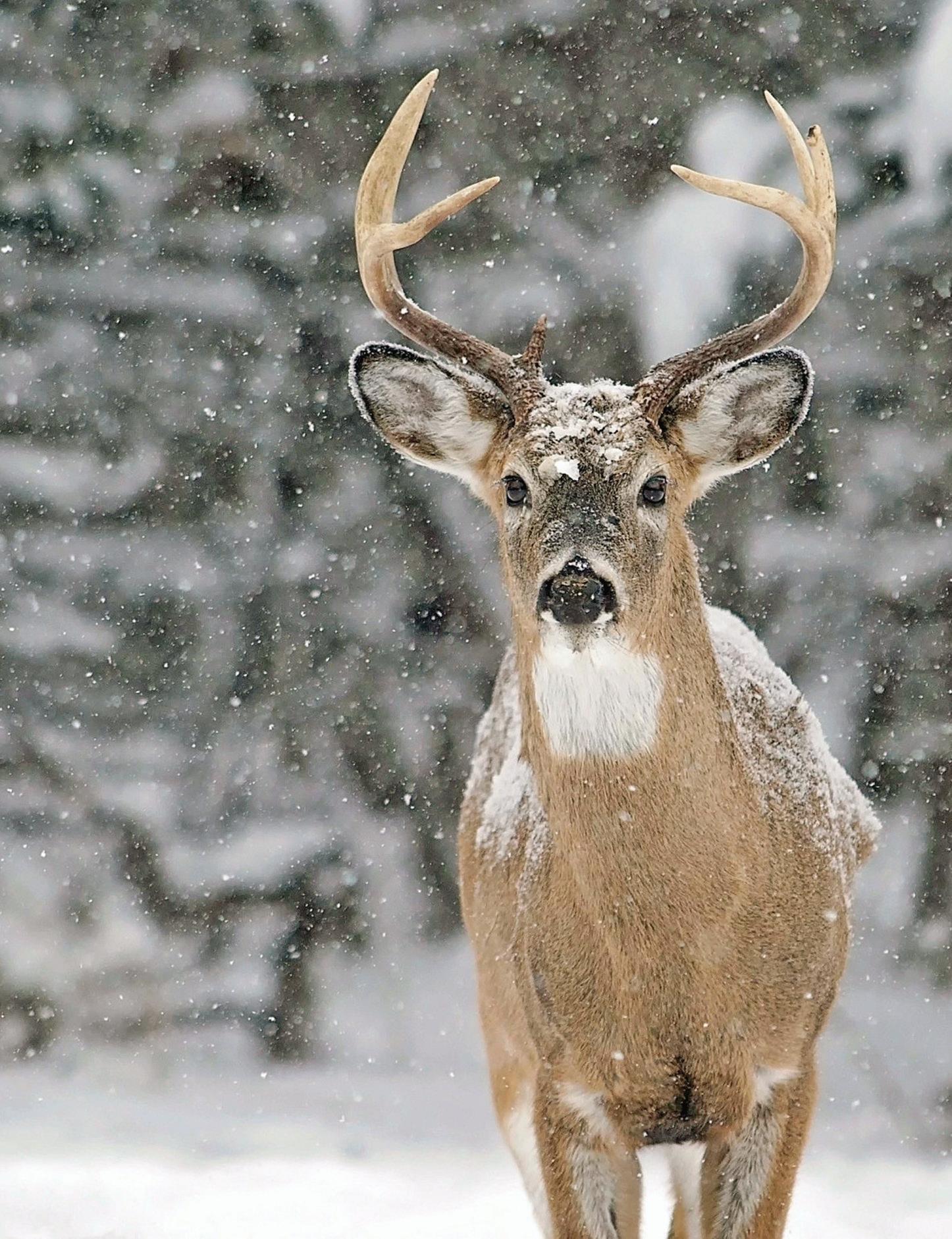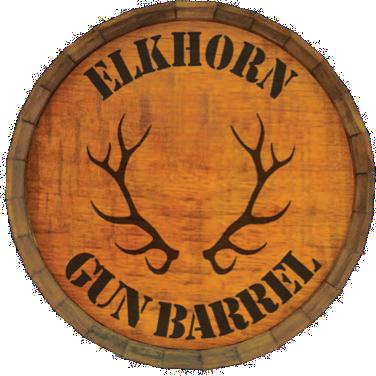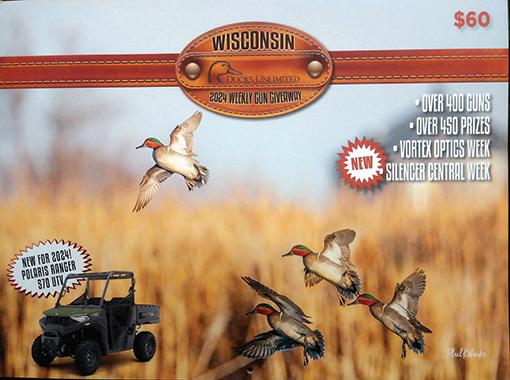OUTDOORS Fall







Archers and crossbow users began hunting for white-tailed deer in midSeptember while the gun deer season is several weeks away. But before they head outdoors for the season start in Wisconsin, hunters are encouraged to have their equipment assessed and one business ready to serve them is Reineman’s True Value in Burlington.
Jeff Koenen, owner of the local store, said as of early September he had already seen customers come in seeking services for the bow hunting season as well as the gun deer season, which is in November.
Reineman’s, 417 Milwaukee Ave., Burlington has a gunsmith and archery manager on staff to help hunters prepare for their outings.
“We’ve got a gunsmith who works in the store here, we service just about anything gun-wise. We have an archery manager here three days a week. He will make sure that the bows are safe, and strings are safe,” Koenen said.
“If you haven’t had your gun or bow checked out in the past year, you probably will want to get it checked. That way, something doesn’t happen in the field, where you could hurt yourself or somebody else, or miss that shot on the big buck,” he added.
Earlier the better
According to Koenen, hunters should be proactive in seeking services with regards to their equipment because of wait times and demands.
Services include bore sighting scopes, cleaning firearms, checking arrows for archery equipment, and ensuring the equipment isn’t damaged before hunters begin their pursuit.
“The closer you get to gun deer season, if you need something done to your rifle, whether it is putting a scope, cleaning them, the longer it takes to get through the guns themselves,” he said.
While demand will likely increase, according to Koenen, Reineman’s should have an ample supply of ammunition for the upcoming gun deer season.
The True Value store in Burlington, like several other sporting goods stores throughout the area and beyond, experienced a shortage of ammunition during a good portion of the COVID-19 pandemic.
According to an Associated Press report in 2021, the COVID-19 pandemic, coupled with record sales of firearms, caused the ammunition shortage and put a strain on law enforcement agencies, recreational shooters and hunters as well as people seeking firearms for protection.
However, since that time, Koenen said he has seen ammunition supplies return to pre-pandemic levels, noting Reineman’s should be able to meet demand this year compared to the past two years.
“We are a lot better off than in the last couple of years,” Koenen said. “The industry itself was pretty roughed up during COVID and they are catching up to where they need to be.”
Meeting demands
Reineman’s, which also has a Paddock
Archery and crossbow
Sept. 16 to Jan. 7, 2024
Extended bow until Jan. 31, 2024 in metro subunits and Farmland Counties.
Youth deer hunt
Oct. 7-8
Gun deer hunt for hunters with disabilities
Oct. 7-15
Gun
Nov. 18-26
Muzzleloader
Nov. 27-Dec. 6
Statewide antlerless-only hunt
Dec. 7-10
Antlerless-only holiday hunt
Dec. 24 to Jan. 1, 2024
Lake store, has the necessary supplies archers and bowhunters.
Koenen said the store offers crossbows, compound bows, recurve bows, arrows and even custom makes arrows for customers.
“Archery-wise, you name it, we probably have it,” Koenen said.
While Reineman’s offers diverse inventory, according to Koenen, the store has seen higher demand for crossbows in recent years because they have become user-friendly.

“More and more people are going with the crossbow,” he said. “It’s a little bit easier to use.”
Koenen said the store features Killer Instinct brand bows.
For gun deer season, Reineman’s offers accessories such as gun locks, gun cases and ammunition boxes for hunters looking to keep them dry if the weather brings rain.
“We have gun locks, and if someone
needs a gun lock, we do have free gun locks,” he said. “We have gun cases, whether they are hard cases or soft cases, and ammo lock boxes to keep them dry and safe,” he said.
Reineman’s also has another important accessory for hunters – scent eliminators –which eliminates human odors and allows a more efficient hunting experience for people looking to bag a whitetail deer.
“We’ve got the knowledge to be able to answer questions for hunters,” Koenen added.
The Wisconsin Department of Natural Resources recently issued a reminder to hunters about online resources it has available on its website.
Those resources include a list of regulations, a full schedule of hunting season dates, hunting hours and other pieces of information.
As for licensing, anyone born on or after Jan. 1, 1973, should have hunter certification top purchase a hunting license unless hunting under the Mentored Hunting Law, the DNR wrote on its website.
For more information, visit dnr. wisconsin.gov.
Hunting is big business in North America. In 2017, more than 15 million people hunted in the United States. The National Shooting Sports Foundation reports that sportsmen and women contribute nearly $9.4 million to the economy every day.
Millions of hunters take to forests and fields every year. All hunters, whether old pros or newbies, can benefit from revisiting some safety procedures before their first outing this season.
Weather should be a consideration whenever people spend a significant amount of time outdoors. Hunters typically leave before dawn and arrive home after dusk.
Hypothermia is a very real risk for hunters who may be out in snow or wet conditions. It’s possible to get hypothermia by overdressing as well. Sweating and then being exposed to dropping temperatures puts people at risk for hypothermia.
Hunters should dress in layers with moisture-wicking materials and a waterrepellant outer layer. In addition, check the weather forecast before heading out as a last second precautionary measure.

The Wisconsin Department of Natural Resources recommends hunters follow these four basic principles of firearm safety – known as TABK:
Treat every firearm as if it is loaded;
Always point the muzzle in a safe direction;
Be certain of your target and what is
Seasoned hunters and novices alike can benefit from revisiting some safety procedures before their first outing this season.
beyond it; and
Keep your finger outside the trigger guard until ready to shoot.
For tree stand users, here are some easy tips to follow:

• Always use a full-body harness;
• Always unload your firearm while climbing into or out of the stand; and
• Maintain three points of contact during the ascent or descent – two hands and one foot, or two feet and one hand. Each deer drive should be planned in
advance with safety as the top priority, King said. “Everyone involved in the drive should know and understand the plan.”
If you plan to participate in a deer drive:
• Review the four firearm safety principles;
• Reconfirm you have positively identified your target;




• Reconfirm you have a safe backstop for your bullet; and
Review and stick to your hunting plan. Make sure all in the hunting party honor it.
For more information regarding hunter education and tips for safe hunting in Wisconsin, search the DNR website, dnr. wi.gov, for keywords “safety tips.”
Hunters should always let others know where they will be when leaving in the morning. If something should happen, people back home can alert authorities if something goes awry.
Always check equipment and maintain it properly. Equipment should include gear colored in hunter’s orange. That extends to dogs if they are accompanying hunters on a trip. This makes hunters more visible to other hunters. Also, carry a first aid kit, a charged mobile phone or a satellite phone to maintain contact with others in case of emergencies.
These are just some of the safety protocols that should be followed when hunting. Non-hunters should exercise caution during hunting seasons, particularly when entering forests and areas that hunters frequent.


The Wisconsin Department of Natural Resources reminds trail riders and hunters alike to wear safety equipment when operating an off-highway vehicle. Whether you’re out for a day of trail riding or headed to the tree stand, a helmet and seatbelt can save your life.
By observing these best practices, hunters and recreational riders can ensure a safe and enjoyable time outdoors:
• Wear a seatbelt and helmet whenever the vehicle is in motion. Many of the fatalities that occur due to slow rollovers on hills could have been prevented had proper safety equipment been worn.
• Ride Sober – Hunt Sober. Hunting can mean traversing especially difficult terrain. Always drive at a safe speed and within your abilities.
• Visibility is important. Remember, headlights must always be on.
“Just as you’d wear a tree stand harness for safety while hunting, a seatbelt and helmet while on a UTV will keep you safe for seasons to come,” said Lt. Jacob Holsclaw, DNR Off-highway Vehicle Administrator.
“It is especially important to remember your safety
equipment on the ride to your stand, not just when you’re in it,” Holsclaw added.
Thus far in 2023, 24 people have been killed in ATV/ UTV crashes. Most of them were not wearing seat belts or helmets. Several incidents also involved alcohol and speed as contributing factors.
Choosing to wear the appropriate safety gear and operating responsibly, whether on the trails, routes or private property, greatly reduces the chance of a serious injury or fatal crash.
One of the best things ATV and UTV operators can do to operate safely is take an online safety course. A list of approved safety education classes is available on the DNR Safety Education webpage. Wisconsin law requires every operator involved in a crash to report the incident without delay to law enforcement officials. Additionally, the operator must submit a written report to the DNR within 10 days of the incident.
For more information on ATV and UTV recreation, classes and safety in Wisconsin, visit dnr.wisconsin. gov and search ATV/UTV riding.
Policyholders who work with mutual insurance company have a shared purpose: getting the best coverage and protection available. And mutual insurance delivers because mutuals serve policyholders, not shareholders. Our decisions are always based on what’s best for you. Plus local agents offer customized solutions for all your insurance needs. Find out how mutual insurance can work for you.





 By Eric Canania WISCONSIN DNR
By Eric Canania WISCONSIN DNR
Last year’s deer harvest in the Southern District was on par with the past 5-year average. The mild winter conditions we experienced should lead to ample opportunities and happy hunters this fall, according to the Wisconsin Department of Natural Resources.


Although spring was slow to start, warming temperatures and early rainfall quickly resulted in a good spring green-up that should have provided abundant cover and high-quality spring forage for does nursing fawns and bucks during antler development.
In addition, antlerless harvests have been below recommended levels over the last couple of years and our highly productive farm ground continues to grow the deer population throughout much of the Southern Farmland Zone. Even with such favorable conditions, hunters need to keep in mind that there is great variation in the quality of the habitat across the landscape. As a result, the number of deer inhabiting individual properties can vary significantly. Habitat management even in highly productive regions, such as southern Wisconsin, is still very important.
The Southern District encompasses a wide range of deer habitat types. These habitats range from the high wooded ridges and coulees in the southwest to the flat productive farmlands of the southcentral
Conservation Patron .......................................... $165
Conservation Patron Junior (age 12 to 17) $75
Sports $60
Sports Junior (age 12 to 17) $35
(Includes general fishing, small game, deer with firearm.)
Gun deer $24 (new buyer $5)
Archery $24 (new buyer $5)
Junior Gun Deer (age 12-17) $20
Junior Archery (age 12-17) $20
Additional Herd Control Antlerless Deer Carcass Tag $5
Unit Specific Antlerless Deer Carcass Tag $12
All hunting licenses are effective immediately after purchase and with the opening of the specific seasons.
Gun and archery deer licenses may be purchased before and during any open deer season.
Note that all 2022 deer hunting licenses expired on March 31, 2023.
Persons born on or after Jan. 1, 1973, must present their Wisconsin Hunter Education certificate or proof of a hunter safety course recognized by the Wisconsin Department of Natural Resources from another state, province or country), previous year’s Wisconsin hunting license, or proof of successful completion of basic training in the U.S. Armed Forces, Reserves or National Guard to purchase any hunting license.
A certificate of successful completion of a Bow Hunter Education Course can be used to purchase an archery license.
For course information, visit the website at dnr. wi.gov.
The Wisconsin Department of Natural Resources reminds hunters to test their deer for chronic wasting disease (CWD) before eating venison, as advised by human health organizations.
The Wisconsin Department of Health Services, the Centers for Disease Control and Prevention and the World Health Organization all recommend against eating meat from deer that test positive for CWD.
Infected deer typically appear healthy for many months after contracting the disease, so DHS encourages testing for the disease regardless of the physical condition of the harvested deer, especially in areas prevalent with CWD. To date, there have been no reported cases of CWD infection in humans.
CWD is a contagious, fatal neurological disease that affects the nervous system of deer, elk, moose and caribou. It belongs to the family of diseases known as transmissible spongiform encephalopathies (TSEs) or prion diseases.
Prions are misshaped proteins that can spread the disease through direct animal-to-animal contact or in the environment through bodily substances or the carcass parts of an infected deer. Prions are extremely resilient and capable of remaining in the soil for years, potentially infecting several deer from a single source.
The disease can have an incubation period of over a year, which means infected deer can appear healthy for months before showing signs of illness. When signs are visible, the common signs are drastic weight loss, drooped head and ears, loss of coordination, excessive salivation and reduced fear of humans.
The DNR offers different options for hunters to test their deer for CWD. These choices are free and accessible to every hunter in the state. Hunters may choose from the following four options:
• Self-service kiosks open 24/7: Kiosks contain supplies for hunters to drop off their deer’s head with five inches of neck attached for testing. This is a great option for antlerless deer or any deer that has already been skull-capped or caped out by a taxidermist.
• In-person with cooperating partners: Meat processors and other businesses can collect the deer head for sampling later or remove the lymph nodes at the time of drop-off. This is a good option for hunters who intend to mount their deer. If your taxidermist is not a cooperator, ask for the caped-out head back so you can drop it off at a kiosk.
• At-home via lymph node sampling: Hunters unable to stop by a kiosk or cooperator within a day or two of harvest may pick up a kit ahead of time. Hunters can extract the retropharyngeal lymph nodes using the provided instructions and return the lymph nodes to the DNR or a kiosk for testing.
• By appointment with local DNR staff: This is a good option for hunters who want to have a European mount done. Hunters can contact their local wildlife management staff to schedule an in-person appointment. Hunters may choose their preferred method and find the nearest accommodating location using the DNR’s CWD sample mapping application.
CWD testing, proper carcass disposal and following baiting and feed regulations are three important ways hunters can help slow the spread of CWD this season. To learn more about CWD, visit the DNR’s website, dnr.wisconsin.gov and search “CWD.”
• CONTINUED FROM PAGE 6
to the highly urbanized landscape in the southeastern counties, along Lake Michigan’s border. We also host the rolling southern kettles in the east and an extensive mix of wetland, woodland and ag-land in Dodge, Jefferson and Columbia counties. This high level of variation in habitat types, conditions and quality contributes to great hunting and a robust deer population that has been stable to increasing year after year in many areas of southern Wisconsin.
Deer populations in the south tend to be somewhat higher in the western and central portions of the district due to several habitat and human population differences, but excellent opportunities to harvest deer, even impressive bucks, can be found in all counties that make up the Southern District. DNR staff are continually impressed with the number and the quality of deer that are observed and harvested each year in the Southern District. This is a testament to the productivity and resiliency of our habitat and local deer herd. It’s no wonder why Wisconsin is and has been a world-class destination for white-tailed deer hunting.
Early season natural food sources such as mast- producing trees, native forbs/ browse and early successional type fields appear to be surviving despite yet another year of low summer rainfall. The beauty of most natural food sources is that they tend to be adaptive and resilient to shifting weather conditions. Many of the hard and soft mast trees are still showing a promising crop. In addition to natural food sources, early season agricultural foods such as lush alfalfa, clover and soybeans are prime locations for hunters to begin their scouting
efforts in late summer or early fall.
Pre-season scouting of early season food sources can significantly reduce the guesswork during the hunting season and can put hunters within range of unpressured deer before they switch up their patterns and become wise to hunting pressure. The USDA Wisconsin Crop Progress & Condition Report is reporting short to very short top and subsoil moisture levels in the southern part of the state, as of July 3. Hunters who plan to plant fall food plots should consider using minimal tillage or no-till methods to conserve as much soil moisture as possible. Timing plantings just before rainfall and utilizing minimal soil disturbance methods will increase the likelihood of a successful plot in these drought conditions.
With any luck, a few consistent and measurable rainfall events could have the potential to make up for lost ground, so we are hopeful to see more rain in the forecast. Weather permitting, these food sources should provide plenty of opportunities for hunters to base their hunting locations around. If drought conditions continue, hunters will want to take time to scout these food sources to make sure there will be no surprises come hunting season.
The rut may be exciting to hunt, but seasoned hunters know that it can be unpredictable at best. While early season hunting might be warm and buggy, it also offers a better opportunity to take notice of deer sign and reap the benefits of scouting efforts. Hunters should keep in mind that once seasonal foods are no longer available or palatable, deer will begin expanding their range looking for alternatives. In areas with the highest deer numbers, habitat
damage or a reduction in habitat quality can occur. This results in deer traveling further in search of other food sources as they prepare for winter.
Appropriate habitat and herd management can help landowners achieve their property goals and increase hunting success. The Deer Management Assistance Program (DMAP) is a private land management program offered by the Wisconsin DNR that helps landowners interested in managing their properties for better habitat and increasing their hunting success.
I encourage folks that want to learn more about habitat and quality deer herd management to sign up for the Deer Management Assistance Program at dnr. wi.gov, keyword “DMAP.”
Most deer within the Southern District are harvested on private property, which makes up more than 90 percent of the district landscape. In addition, the district offers tens of thousands of acres of county, state and federally owned lands open to deer hunting in southern Wisconsin. Public lands often get a bad rap as difficult to hunt but savvy hunters who are dedicated, adaptable, not afraid to go the extra mile (sometimes literally) and occasionally utilize non-traditional methods will find adventure and plenty of deer to match wits with this fall.
If you’re looking for a new area to hunt and have never explored our public lands, I highly recommend giving it a shot. If you plan to hunt on private lands, get out well in advance of deer season to meet with landowners and request permission if you don’t already have it.
Another important aspect for Southern
District deer hunters to keep in mind is CWD. It slowly continues increasing in prevalence and geographic area within the district and state. Last year, Wisconsin detected just over 1,492 CWD-positive deer through annual sampling efforts, the majority of which came from the Southern District.
Going into the 2023 deer season, hunters should be aware that baiting and feeding of deer is prohibited in all Southern District counties, except for Ozaukee.
County Deer Advisory Councils (CDACs) are offering, on average, similar quotas, antlerless deer harvest authorizations and extra hunting seasons in response to public feedback and the stable to increasing deer population trend.
For the 2023 deer hunting season, 14 counties in the Southern District are offering the antlerless- only Holiday Hunt, and 12 counties are offering the extended archery/crossbow season.

Check out the DNR’s deer hunting webpage for more details and maps showing which counties are 2023 Deer Fall Forecast, Wisconsin Department of Natural Resources offering additional seasons. These additional seasons are a great way to enjoy family time afield during the holiday season and to put extra meat in the freezer.
The 2023 deer season will be here before we know it and will be welcomed by deer hunters all over the nation. On behalf of the Wisconsin DNR, we’d like to wish everyone a safe and successful hunting season!
We hope you take time this fall to get outdoors and enjoy the beauty and worldclass hunting opportunities that Wisconsin has to offer.

MANY USED HANDGUNS, RIFLES, SHOTGUNS IN-STOCK AND ON SALE NOW *Actual










